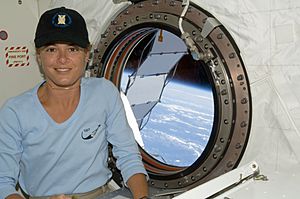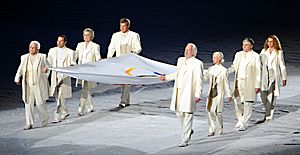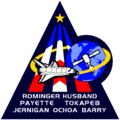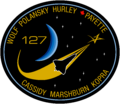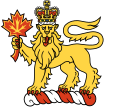Julie Payette facts for kids
Quick facts for kids
Julie Payette
|
|
|---|---|
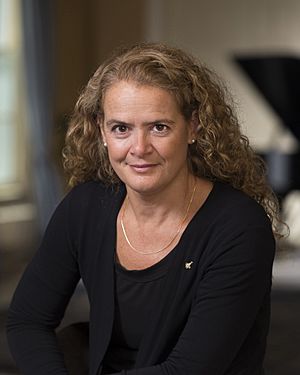
Payette in 2017
|
|
| 29th Governor General of Canada | |
| In office October 2, 2017 – January 22, 2021 |
|
| Monarch | Elizabeth II |
| Prime Minister | Justin Trudeau |
| Preceded by | David Johnston |
| Succeeded by | Mary Simon |
| Personal details | |
| Born | October 20, 1963 Montreal, Quebec, Canada |
| Spouses |
François Brissette
(m. 1992; div. 1999)William Flynn
(m. 2001; div. 2015) |
| Children | Laurier Flynn-Payette |
| Alma mater |
|
| Signature |  |
| Space career | |
| CSA astronaut | |
|
Time in space
|
25 days 11 h 57 min |
| Selection | 1992 CSA Group |
| Missions | STS-96, STS-127 |
|
Mission insignia
|
|
Julie Payette (born October 20, 1963) is a Canadian engineer, scientist, and former astronaut. From 2017 to 2021, she served as the Governor General of Canada. This important role is the Queen's representative in Canada. She was the 29th person to hold this position since Canada became a country.
Payette earned engineering degrees from McGill University and the University of Toronto. She worked as a research scientist before joining the Canadian Space Agency (CSA) in 1992. She became a member of the Canadian Astronaut Corps. She flew on two space missions, STS-96 and STS-127. In total, she spent more than 25 days in space. She also worked as a "capsule communicator" (CAPCOM) at NASA Mission Control Center in Houston. From 2000 to 2007, she was the CSA's chief astronaut.
In 2013, Payette became the chief operating officer for the Montreal Science Centre. She also served on the boards of several organizations. On July 13, 2017, Prime Minister Justin Trudeau announced that Queen Elizabeth II had approved her appointment as the next Governor General. She officially started her role on October 2, 2017.
Julie Payette resigned from her position on January 21, 2021. This happened after a review of the workplace at Rideau Hall, the Governor General's official residence. The review found that there were issues in the workplace environment. She was the second Governor General to resign, but the first to do so because of workplace concerns.
Contents
Becoming an Astronaut
Payette was born in Montreal, Quebec, on October 20, 1963. She went to school in Montreal and then completed an International Baccalaureate diploma in the United Kingdom.
She studied electrical engineering at McGill University. She earned her degree in 1986. Later, she completed a Master's degree in computer engineering at the University of Toronto in 1990. Her studies included artificial intelligence. She also speaks French, English, and some Spanish, Italian, Russian, and German.
Before becoming an astronaut, Payette worked as a systems engineer for IBM Canada. She also worked at the IBM Zurich Research Laboratory in Switzerland. When she returned to Canada, she joined Bell-Northern Research. There, she worked on computer voice recognition.
Joining the Canadian Space Agency
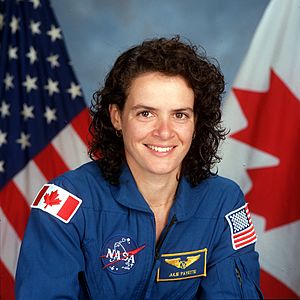
The Canadian Space Agency (CSA) chose Payette as one of four new astronauts in June 1992. Over 5,000 people applied for these spots. After her basic training in Canada, she became a technical advisor. She worked on the Mobile Servicing System, which is a robotic system Canada contributed to the International Space Station.
To prepare for space, Payette got her commercial pilot licence. She also trained on special aircraft that simulate reduced gravity. In 1996, she became certified to operate a deep-sea diving suit. She also became a captain on the CT-114 Tutor military jet. Payette has flown over 1,300 hours, including 600 hours in high-performance jets.
In 1996, Payette went to the Johnson Space Center in Houston, USA. She trained there to become a mission specialist. She finished her astronaut training in April 1998.
Space Missions
Payette was the chief astronaut for the Canadian Space Agency from 2000 to 2007. She also worked as a capsule communicator (CAPCOM) at the Mission Control Center in Houston. She helped guide several space missions from the ground.
STS-96 Mission
Payette's first space flight was on the Space Shuttle Discovery. This mission, called STS-96, lasted from May 27 to June 6, 1999. During this flight, the crew performed the first manual docking of the shuttle to the International Space Station. They delivered four tons of supplies to the station.
On Discovery, Payette was a mission specialist. Her main job was to operate the Canadarm robotic arm. The STS-96 mission orbited Earth 153 times. It traveled over 6 million kilometers in 9 days, 19 hours, and 13 minutes. Payette was the first Canadian to help build the Space Station and to go inside it.
STS-127 Mission
Payette flew to space again in 2009. She was a mission specialist on Space Shuttle Endeavour for mission STS-127. This mission took place from July 15 to 31, 2009. She was the flight engineer and lead robotic operator. During this mission, another Canadian astronaut, Robert Thirsk, was already on the space station. This was the first time two Canadians met in space!
During her second mission, Payette brought a signed sweater of the famous Montreal Canadiens hockey player Maurice Richard. She said she brought "The Rocket" into the rocket to celebrate the hockey team's 100th anniversary.
After Space Missions
From 2011 to 2013, Payette worked at the Woodrow Wilson International Center for Scholars in Washington, D.C. She was also a scientific delegate for the Quebec Government in the United States.
For the next three years, Payette was the chief operating officer of the Montreal Science Centre. She also served as a vice president of the Canada Lands Company. She later left the Science Centre.
In 2016, Payette joined the board of the Canadian Olympic Committee. She attended the 2016 Summer Olympics. She left the committee in 2017. Around 2017, she was also appointed to the International Olympic Committee's Women in Sports Commission.
Payette has served on many other boards and committees. These include Queen's University, Canada's Olympic program, the Montreal Bach Festival, and the National Bank of Canada. She is a member of the Ordre des ingénieurs du Québec. She is also a fellow of the International Academy of Astronautics.
Governor General of Canada
On July 13, 2017, it was announced that Prime Minister Justin Trudeau had recommended Payette to be the 29th Governor General of Canada. She officially took office on October 2, 2017. Before this, she met with Queen Elizabeth II on September 20, 2017. The Queen invested her with several important Canadian honours.
When she was installed as Governor General, Payette encouraged Canadians to work together. She spoke about important issues like climate change, migration, and poverty. She said she hoped her time as Governor General would show that people can achieve great things by working together for the common good.
Time in Office
In September 2018, Payette received some attention for comments she made. She spoke about the importance of science and critical thinking. She said that people should accept science and not believe in things like astrology or that sugar pills can cure cancer. She later explained that she was still learning how to best express herself in her new role.
Later, there were discussions about her work schedule. Some people felt she had not visited enough provinces in her first year. The Governor General's office said that the first year is a time for learning and adjustment.
During her time as Governor General, there were also concerns about spending at Rideau Hall. There were reports about money spent on projects that were not completed. It was also noted that she did not move into Rideau Hall after renovations.
Resignation
On July 21, 2020, news reports suggested that Payette had created a difficult work environment at Rideau Hall. Two days later, the Privy Council Office started an investigation into these claims. Many former employees of the Montreal Science Centre also reported similar experiences with Payette. The independent report found that Payette and her second-in-command had created a challenging work environment.
On January 21, 2021, Julie Payette announced her resignation as Governor General. This was an unusual step. She stated that staying in her role "would risk inflicting serious damage on the office." Her resignation became official the next day. The secretary to the Governor General also resigned at the same time. Richard Wagner, the chief justice of Canada, took over as the temporary administrator of the government.
There was some criticism that Payette's background had not been fully checked before her appointment. This was because similar workplace concerns had been raised in her previous jobs. After her resignation, there was also discussion about the pension and benefits that retired Governors General receive.
Personal Life
Payette has been married twice. She has a son born in 2003. She enjoys playing the piano and has sung with major orchestras and choirs. Her hobbies include running, skiing, racquet sports, and scuba diving.
Honours and Awards
| Viceregal styles of Julie Payette (2017–2021) |
|
|---|---|
| Reference style |
|
| Spoken style |
|
Julie Payette has received many honours and awards throughout her career.
- Knight of the National Order of Quebec (2000)
- Member of the Canadian Aviation Hall of Fame (2010)
- Companion of the Order of Canada (CC) (2017)
- Commander of the Order of Military Merit (CMM) (2017)
- Commander of the Order of Merit of the Police Forces (COM) (2017)
- Queen Elizabeth II Diamond Jubilee Medal (2012)
- Canadian Forces' Decoration (2017)
- NASA Space Flight Medal (1999)
- NASA Exceptional Service Medal (2010)
She also holds many honorary doctorates from universities across Canada and internationally.
Other Recognitions
A school in Whitby, Ontario, is named Julie Payette Public School.
Payette helped carry the Olympic flag at the opening ceremonies of the 2010 Olympic Winter Games in Vancouver. She also attended the opening ceremony of the Pyeongchang Olympics in 2018.
Images for kids
See also
 In Spanish: Julie Payette para niños
In Spanish: Julie Payette para niños
 | Stephanie Wilson |
 | Charles Bolden |
 | Ronald McNair |
 | Frederick D. Gregory |


